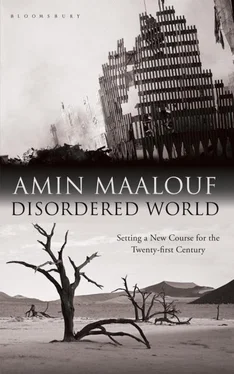In this context, the advent of Nasser was greeted with huge anticipation and his nationalist rhetoric quickly whipped up enthusiasm. The Arabs had been dreaming for so long of a man who would emerge to lead them confidently towards the realisation of their dreams — unity, true independence, economic development, social advancement, and above all restored dignity. They wanted Nasser to be that man; they believed in him, followed him, loved him. His failure would shake them profoundly, making them lose all confidence in their leaders for a long time, and in their own future.
Responsibility for Nasser’s failure is widely shared. It is true that he was violently opposed by the Western powers, Israel, the oil-producing monarchies, the Muslim Brotherhood, liberals, and also at certain points by Arab communists. But none of his enemies contributed as much to the downfall of Nasserism as Nasser himself.
The man was not a democrat, which is putting it very mildly indeed. He established a single-party system with 99 per cent plebiscites, a ubiquitous secret police, and internment camps where Islamists rubbed shoulders with Marxists, common criminals and unfortunate members of the public who had spoken out ill-advisedly. His nationalism was strongly coloured by xenophobia, which caused the end of a fruitful, centuries-old coexistence between countless Mediterranean communities — Italians, Greeks, Maltese, Jews, Syro-Lebanese Christians — especially in Alexandria. His management of the economy was a model of absurdity and incompetence: one of his regular practices was to appoint as head of a nationalised industry some military man he wanted to reward or move sideways — not the best way to ensure it was effectively run. The army itself, which Nasser had built up at great cost with help from the Soviets, and which appeared formidable, collapsed in just a few hours on 5 June 1967 when faced with the Israelis. The Egyptian president had fallen into a trap set by his enemies which he had been unable to avoid.
I think I have listed most of the charges that can be made against him, but it is important to add that Nasser was more than just this. His ascent was probably the most significant event in Arab history for centuries. So many leaders since then have committed acts of folly in the hope of occupying the place in Arab hearts that he once occupied. The megalomaniac adventures of Saddam Hussein are incomprehensible unless one bears in mind that his references to Nebuchadnezzar and Saladin were nothing but vain, pompous rhetoric — his only real ambition was to become a second Nasser. Many others besides him have dreamt the same thing; some still dream of it, even though times have changed, and even though Pan-Arabism, support for the Third World and socialism have lost their appeal.
In the early 1950s, the Arab world was just beginning to leave the colonial era behind: the Maghreb was still under French authority; the Gulf emirates depended on the British crown; and if some countries had obtained their independence, it was independence in name only for several of them. That was especially the case in Egypt, where the English made and unmade governments without paying too much heed to King Faruk, whose prestige in the eyes of his people was in perpetual decline. They were irritated by his lifestyle, the corruption of his entourage, his supposed eagerness to please the English, and also, after 1948, on account of his army’s humiliating defeat at the hands of the Israelis.
The ‘Free Officers’ who took power in Cairo in July 1952 promised to repair all these affronts at once: bringing an end to the old regime, completing independence by doing away with British influence and retaking Palestine from the Jews. These were objectives which corresponded to the aspirations of the broad mass of Egyptian people and of all Arabs.
Since Egypt was, according to the phrase used at the time, the Arabs’ ‘big sister’, her experience was very closely observed.
The Egyptian coup d’état passed off peacefully, and even with a certain generosity. The deposed king was escorted to his yacht with military honours and is even said to have been allowed to take his precious collection of carved walking sticks with him. He spent the rest of his life between the Côte d’Azur, Switzerland and Italy, far from any political activity. For a year the monarchy was not even abolished, since the crown prince, who was only a few months old, remained the nominal head of state.
No dignitary of the old regime was killed or given a long prison sentence. They were stripped of their property, titles and privileges, but their lives were spared. And while some of them chose to go into exile, most of them stayed at home and were barely even concerned. The famous singer Oum Kalsoum, guilty of having sung in praise of the ousted king, was taken off air the day after the coup by zealous military men. She complained to a journalist friend, who immediately told Nasser, and the ban was lifted at once. It was not long before she was the favourite singer of the new regime.
This good-natured aspect of the Egyptian revolution warrants favourable comparison with so many other events of the same sort which have happened throughout history and which were accompanied by a bloodbath — think of Oliver Cromwell in England, the France of Robespierre, Lenin’s Russia, or, closer in time and place, the overthrow of the monarchies in Iraq, Ethiopia and Iran.
But it is worth qualifying this assessment. If Nasser was not a bloody tyrant, neither was he a pacifist. While it is true that the pashas of the old regime all died peacefully in their beds, other political enemies on the right and left whom he judged to be a threat to his power were hanged, shot or killed, and many others died under torture. In addition, Nasser’s brand of nationalism always displayed, in his rhetoric as well as in his decisions, a systematic hostility towards everything which was non-native to Egyptian society.
My intention here is not to pass an ethical judgement, even if I have one and it strikes me as legitimate to form one. I am thinking especially of the example that Nasser could have set for those who came after him. He was a model for the Arab world as well as for the whole Muslim world and Africa. As a result, everything he said and did had an educational value for hundreds of millions of people of all conditions across these countries. Few leaders reach such a summit, and only the best of them are conscious of the heavy responsibility that comes with this privilege, especially when it is a case of tracing the path for a new or renascent nation.
An eloquent example from our own time is that of Nelson Mandela. Borne on a powerful wave of support, with an aura of glamour conferred by his long years of imprisonment, he was in a position to call the shots. His people scrutinised his every word and gesture. If he had voiced bitterness, settled scores with his jailers, punished everyone who supported or tolerated apartheid, no one could have blamed him. If he had wanted to remain president of his country until his dying breath and governed autocratically, no one could have stopped him. But he was careful to give very different signals quite explicitly. He did not just pardon his persecutors, he made a point of visiting the widow of former prime minister Verwoerd, one of the architects of segregation, to tell her that the past was over and that she too had a place in the new South Africa. The message was clear: I, Mandela, who suffered persecution under a racist regime and who did more than anyone else to put an end to this abomination, made a point, even though I am president, of going to sit under the roof of the man who had me thrown in prison, to drink tea with his wife. So none of my supporters should feel they have a right to raise the stakes for militancy or revenge.
Читать дальше












